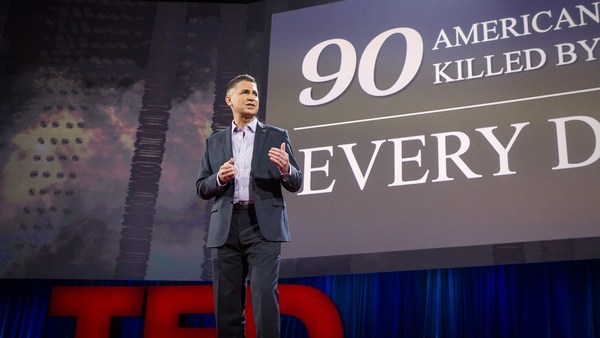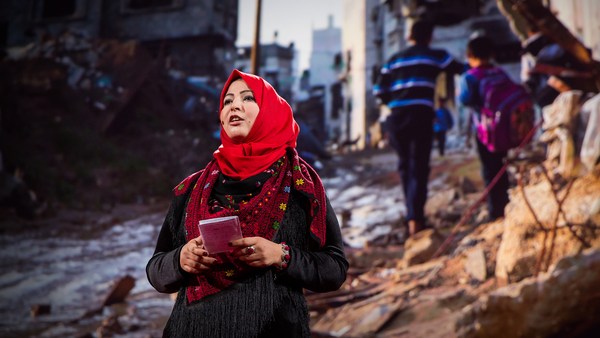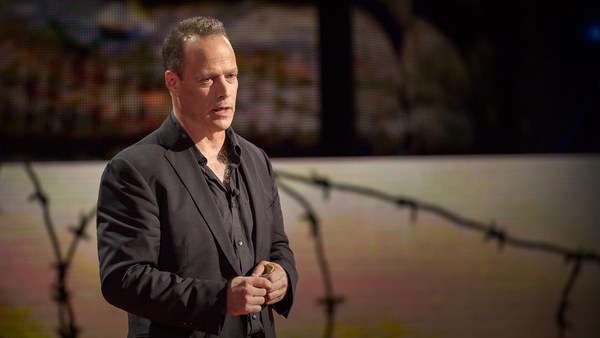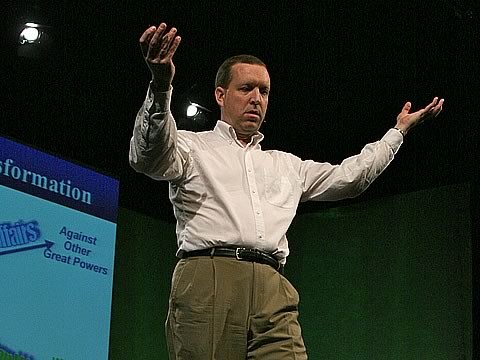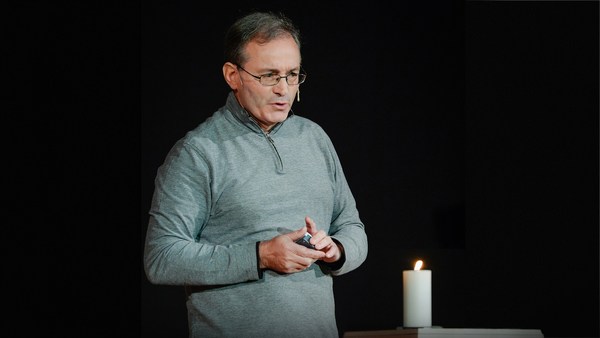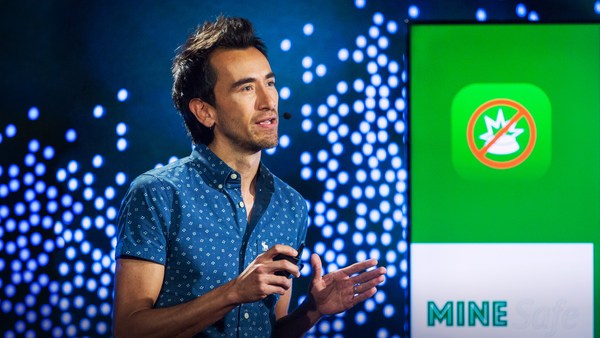Thank you very much. Good evening.
Some of you may have noticed that my last name is Nutt. And if you did, you are forgiven for wondering how a Nutt managed to end up in a war zone. I actually was offered, right out of medical school, and accepted a volunteer contract to work with UNICEF in war-torn Somalia, that was worth one dollar. And, you see, I had to be paid this dollar in the event that the UN needed to issue an evacuation order, so that I would be covered. I was, after all, heading into one of the world's most dangerous places. And by now, some of you may be asking yourselves, and I just want to reassure you, that I did get half the money up front.
(Laughter)
But you see, this is how, with 50 cents in my pocket, I ended up in Baidoa, Somalia. Journalists called it the "city of death." And they called it the city of death because 300,000 people had lost their lives there -- 300,000 people, mostly as a result of war-related famine and disease.
I was part of a team that was tasked with trying to figure out how best to respond to this humanitarian catastrophe. It was right on the heels of the Rwandan genocide, and aid money to the region was drying up. Many aid organizations, unfortunately, had been forced to close their doors. And so the question that I was asked to specifically help answer, which is one that aid workers ask themselves in war zones the world over, is: What the hell do we do now? You know, the security environment in Somalia at that moment in time -- and nothing has really changed too much -- can best be described as "Mad Max" by way of "A Clockwork Orange."
And I remember very distinctly a couple of days after my arrival, I went up to a feeding clinic. There were dozens of women who were standing in line, and they were clutching their infants very close. About 20 minutes into this conversation I was having with this one young woman, I leaned forward and tried to put my finger in the palm of her baby's hand. And when I did this, I discovered that her baby was already in rigor. She was stiff, and her little, lifeless hand was curled into itself. She had died hours before of malnutrition and dehydration. I later learned that as her baby was dying, this young woman had been held for two days by some teenage boys who were armed with Kalashnikov rifles, and they were trying to shake her down for more money, money she very clearly did not have. And this is a scene that I have confronted in war zones the world over; places where kids, some as young as eight -- they are this big -- and those kids, they have never been to school. But they have fought and they have killed with automatic rifles.
Is this just the way the world is? Some will you tell you that war is unavoidably human. After all, it is as old as existence itself. We say never again, and yet it happens again and again and again. But I will tell you that I have seen the absolute worst of what we as human beings are capable of doing to one another, and yet I still believe a different outcome is possible. Do you want to know why? Because over 20 years of doing this work, going in and out of war zones around the world, I have come to understand that there are aspects of this problem that we, all of us, as people occupying this shared space, that we can change -- not through force or coercion or invasion, but by simply looking at all of the options available to us and choosing the ones that favor peace at the expense of war, instead of war at the expense of peace.
How so? Well, I want you to consider this: there are at least 800 million small arms and light weapons in circulation in the world today. The vast majority of civilians, like that young baby, who are dying in war zones around the world, are dying at the hands of various armed groups who rely on a near-infinite supply of cheap, easy and efficient weapons to rape, threaten, intimidate and brutalize those civilians at every turn. How cheap? Well, in some parts of the world, you can buy an AK-47 for as little as 10 dollars. In many places in which I have worked, it is easier to get access to an automatic rifle than it is to get access to clean drinking water.
And so now the important part: Can anything be done about this? To answer that question, let's take a look at this map of the world. And now, let's add in all of the countries that are currently at war, and the number of people who have either died or have been displaced as a result of that violence. It is a staggering number -- more than 40 million people. But you will also notice something else about this map. You will notice that most of those countries are in the Global South. Now, let's look at the countries that are the world's top 20 exporters of small arms in the world. And what do we notice? Well, you see them in green. You will notice that those are mostly countries in the Global North, primarily Western countries. What does this tell us? This tells us that most of the people who are dying in war are living in poor countries, and yet most of the people who are profiting from war are living in rich countries -- people like you and me.
And then what if we go beyond small arms for a second. What if we look at all weapons in circulation in the world? Who does the biggest business? Well, roughly 80 percent of those weapons come from none other than the five permanent members of the United Nations Security Council, plus Germany. It's shocking, isn't it?
Now, some of you might be saying at this moment in time, "Oh yeah, but OK, hang on a second there ... Nutt."
(Laughter)
Grade school was spectacular for me. It was, really, a wonderful experience.
(Laughter)
But you might be saying to yourselves, You know, all of these weapons in war zones -- they're not a cause, but an effect of the violence that plagues them each and every single day. You know, places like Iraq and Afghanistan, where they need these weapons to be able to maintain law and order, promote peace and security, to combat terror groups -- surely this is a good thing.
Let's take a look at that assumption for just one moment, because you see there has been a boom in the small-arms trade since the start of the War on Terror. In fact, it is a business that has grown threefold over the past 15 years. And now let's compare that to the number of people who have directly died in armed conflict around the world in that same period. What do you notice? Well, you notice that, in fact, that also goes up roughly three- to fourfold. They basically go up and end at the same point.
Now, we can have a circular argument here about whether this increase in fatalities is a response to the increase of small arms, or the other way around. But here's what we should really take away from this. What we should take away from this is that this is a relationship worth scrutinizing, especially when you consider that small arms that were shipped to Iraq for use by the Iraqi Army, or to Syria for so-called moderate opposition fighters, that those arms, many of them, are now in the hands of ISIS; or when you consider that arms that were shipped to Libya are now actively drifting across the Sahel, and ending up with groups like Boko Haram and al Qaeda and other militant groups.
And therein lies the problem. Because, you see, small arms anywhere are a menace everywhere, because their first stop is rarely their last.
Spending on war per person per year now amounts to about 249 dollars -- 249 dollars per person, which is roughly 12 times what we spend on foreign aid, money that is used to educate and vaccinate children and combat malnutrition in the Global South. But we can shift that balance. How do we do this? Well, it is essentially a problem of both supply and demand, so we can tackle it from both sides.
On the supply side, we can push our governments to adopt international arms transparency mechanisms like the Arms Trade Treaty, which makes it so that rich countries have to be more accountable for where their arms are going and what their arms might be used for. Here in the United States, the largest arms-exporting country in the world by far, President Obama has rightly signed the Arms Trade Treaty, but none of it takes effect, it isn't binding, until it is approved and ratified by the Senate. This is where we need to make our voices heard. You know, the curbing of small arms -- it's not going to solve the problem of war. Increased control mechanisms won't solve that problem. But it's an important step in the right direction. And it's up to all of us who live in those rich countries to make change here.
What about on the demand side? You know, there are generations around the world who are being lost to war. It is possible to disrupt that cycle of violence with investments in education, in strengthening the rule of law and in economic development, especially for women. I have personally seen just how incredibly powerful those kinds of efforts can be around the world.
But here's the thing: they take time, which means for you as individuals, if you want to give, please, by all means do it. But know that how you give is just as important as how much you give. Regular contributions like monthly contributions are a far more effective way of giving, because they allow humanitarian organizations to properly plan and be invested over the long term, and to be present in the lives of families who have been affected by war, wars that many of us, frankly, all too quickly forget.
When I first got on that plane for Somalia as a young doctor, I had no idea what it meant to live with war. But I can tell you that I know what it means now. And I know what it means to lie in bed in the pitch-black night and listen to that haunting "pop-pop-pop-pop-pop!" of automatic gunfire, and wonder with absolute dread how many minutes I have left until it will be right on top of me. I can tell you that it is a terrifying and agonizing fear, one that millions of people around the world are forced to confront each and every single day, especially children. Over the years of doing this work, unfortunately, war has killed far too many people close to me. And on at least a couple of occasions, war has very nearly killed me as well.
But I firmly believe, which is why I get up and do what I do every single day, that we can make different choices here. Because you see, war is ours, as human beings. We buy it, sell it, spread it and wage it. We are therefore not powerless to solve it. On the contrary, we are the only ones who can.
Thank you very much, and I want to wish you the greatest success.
(Applause)
